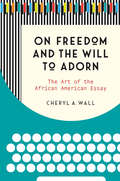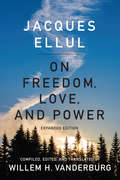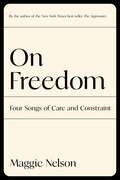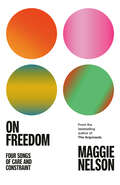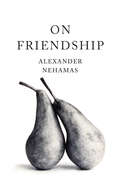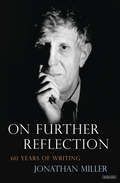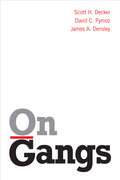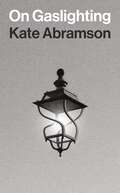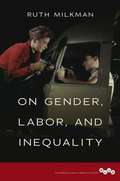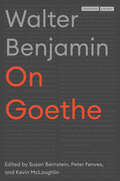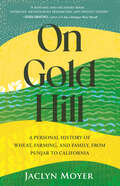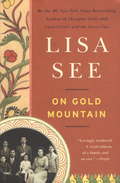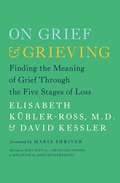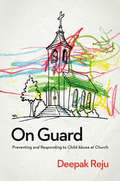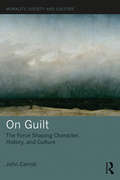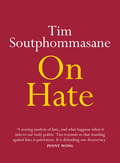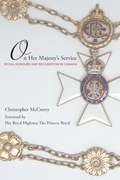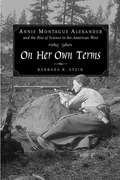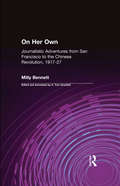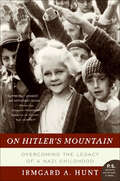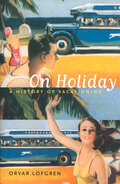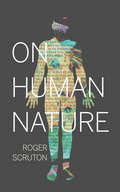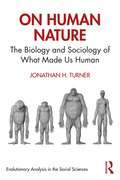- Table View
- List View
On Freedom and the Will to Adorn: The Art of the African American Essay
by Cheryl A. WallAlthough they have written in various genres, African American writers as notable and diverse as W. E. B. Du Bois, James Baldwin, and Alice Walker have done their most influential work in the essay form. The Souls of Black Folk, The Fire Next Time, and In Search of Our Mothers' Gardens are landmarks in African American literary history. Many other writers, such as Ralph Ellison, Zora Neale Hurston, James Weldon Johnson, and Richard Wright, are acclaimed essayists but achieved greater fame for their work in other genres; their essay work is often overlooked or studied only in the contexts of their better-known works. Here Cheryl A. Wall offers the first sustained study of the African American essay as a distinct literary genre. Beginning with the sermons, orations, and writing of nineteenth-century men and women like Frederick Douglass who laid the foundation for the African American essay, Wall examines the genre's evolution through the Harlem Renaissance. She then turns her attention to four writers she regards as among the most influential essayists of the twentieth century: Baldwin, Ellison, June Jordan, and Alice Walker. She closes the book with a discussion of the status of the essay in the twenty-first century as it shifts its medium from print to digital in the hands of writers like Ta-Nehisi Coates and Brittney Cooper. Wall's beautifully written and insightful book is nothing less than a redefinition of how we understand the genres of African American literature.
On Freedom, Love, and Power
by Jacques Ellul Willem H. Vanderburg Dominique North-Ellul Yves Ellul Jean EllulJacques Ellul (1912-1994) was a French law professor, historian, sociologist, lay theologian, and Christian anarchist. During the Second World War, he was active in the French resistance; his efforts to save Jews during this time eventually earned him the title "Righteous Among the Nations." A towering intellectual figure, Ellul taught in Paris and at the University of Bordeaux, wrote and published extensively, and engaged throughout his career in a dialogue between the realities of technology and contemporary life, the tenets of the Christian faith, and the principles of human freedom. Transcribed here for the first time, this series of talks refines and clarifies some of Ellul's most controversial insights into what it means to understand and live out God's wishes.Ellul's evaluation of a number of interrelated books of Scripture, including Genesis, Job, Matthew, and John, challenges Jewish and Christian orthodoxies and more progressive interpretations alike by claiming that the Judeo-Christian tradition is both anti-moral and anti-religious. Promoting a life based on freedom and love, Ellul's thinking opens the door to, in his words, "thinking globally and acting locally."
On Freedom, Love, and Power
by Jacques Ellul Willem H. VanderburgOne of the most important and original thinkers of the twentieth century, Jacques Ellul (1912-1994) was a noted sociologist, historian, law professor, and self-described "Christian anarchist." At the University of Bordeaux, Ellul taught and wrote extensively on the relationship between technology and contemporary culture, the tenets of the Christian faith, and the principles of human freedom and responsibility. On Freedom, Love, and Power is the transcription of a series of talks given by Ellul in 1974 in which he refines and clarifies some of his most controversial insights on the Jewish and Christian Bibles and their relevance to contemporary society.This expanded edition of Ellul's talks features additional material, previously unavailable, that focuses on Christianity's potential service to humanity as a community that exemplifies a society where people are reconciled with one another and with God.
On Freedom: Four Songs of Care and Constraint
by Maggie NelsonSo often deployed as a jingoistic, even menacing, rallying cry, or limited by a focus on passing moments of liberation, the rhetoric of freedom both rouses and repels. Does it remain key to our autonomy, justice, and well-being, or is freedom's long star turn coming to a close? Does a continued obsession with the term enliven and emancipate, or reflect a deepening nihilism (or both)? On Freedom is an expansive, exhilarating work of criticism that examines such questions by tracing the concept's complexities in four distinct realms: art, sex, drugs, and climate. Drawing on a vast range of material, from critical theory to pop culture to the intimacies and plain exchanges of daily life, Maggie Nelson explores how we might think, experience, or talk about freedom in ways responsive to the conditions of our day. Her abiding interest lies in ongoing "practices of freedom" by which we negotiate our interrelation with--indeed, our inseparability from--others, with all the care and constraint that entails, while accepting difference and conflict as integral to our communion. For Nelson, thinking publicly through the knots in our culture--from recent art-world debates to the turbulent legacies of sexual liberation, from the painful paradoxes of addiction to the lure of despair in the face of the climate crisis--is itself a practice of freedom, a means of forging fortitude, courage, and company. On Freedom is an invigorating, essential book that meets the challenges of our time. Maggie Nelson is the author of several books of poetry and prose, including, most recently, the New York Times best seller and National Book Critics Circle Award winner The Argonauts. She has been the recipient of a MacArthur Fellowship, a Guggenheim Fellowship, an NEA Fellowship, an Innovative Literature Fellowship from the Creative Capital Foundation, and an Arts Writers Grant from the Andy Warhol Foundation. She is currently a professor of English at University of Southern California and lives in Los Angeles. A New York Times Notable Book for 2021.
On Freedom: Four Songs of Care and Constraint
by Maggie NelsonSo often deployed as a jingoistic, even menacing rallying cry, or limited by a focus on passing moments of liberation, the rhetoric of freedom both rouses and repels. Does it remain key to our autonomy, justice, and well-being, or is freedom's long star turn coming to a close? Does a continued obsession with the term enliven and emancipate, or reflect a deepening nihilism (or both)? <p><p> On Freedom examines such questions by tracing the concept's complexities in four distinct realms: art, sex, drugs, and climate. Drawing on a vast range of material, from critical theory to pop culture to the intimacies and plain exchanges of daily life, Nelson explores how we might think, experience, or talk about freedom in ways responsive to the conditions of our day. Her abiding interest lies in ongoing "practices of freedom" by which we negotiate our interrelation with--indeed, our inseparability from--others, with all the care and constraint that relation entails, while accepting difference and conflict as integral to our communion. For Nelson, thinking publicly through the knots in our culture--from recent art world debates to the turbulent legacies of sexual liberation, from the painful paradoxes of addiction to the lure of despair in the face of the climate crisis--is itself a practice of freedom, a means of forging fortitude, courage, and company. On Freedom is an invigorating, essential book for challenging times.
On Friendship
by Alexander NehamasFriends are a constant feature of our lives, yet friendship itself is difficult to define. Even Michel de Montaigne, author of the seminal essay "Of Friendship,” found it nearly impossible to account for the great friendship of his life. Why is something so commonplace and universal so hard to grasp? What is it about the nature of friendship that proves so elusive? In On Friendship, the acclaimed philosopher Alexander Nehamas launches an original and far- ranging investigation of friendship. Exploring the long history of philosophical thinking on the subject, from Aristotle to Emerson and beyond, and drawing on examples from literature, art, drama, and his own life, Nehamas shows that for centuries, friendship was as much a public relationship as it was a private one-inseparable from politics and commerce, favors and perks. Now that it is more firmly in the private realm, Nehamas holds, close friendship is central to the good life. Profound and affecting, On Friendship sheds light on why we love our friends-and how they determine who we are, and who we might become.
On Further Reflection: 60 Years of Writing
by Jonathan MillerThis collection of entertaining and enlightening writings from the famous comedian, neurologist, and intellectual is “dazzling from beginning to end” (Oliver Sacks). Actor, doctor, sculptor, TV personality, director of both film and opera—Sir Jonathan Miller’s career covers a vast range of artistic and intellectual pursuits. But common amongst all of these trades is Miller’s exceptional talent for writing about them. On Further Reflection gathers together Miller’s best and most memorable excerpts, articles and essays written over the last six decades. The collection features his reflections on the famous comedy revue Beyond the Fringe, which he cowrote and performed with Dudley Moore, Peter Cook, and Alan Bennett; as well as fascinating explorations of everything from mesmerism to Dickens; neurology to art history; and opera to epistemology. In these pages, Miller contemplates how we interact with our own bodies, and how television changed in the wake of the Kennedy assassination. For each extract he provides a small introduction, placing the writing in the context of his work in the arts and sciences. A celebration of one of our finest minds, On Further Reflection brings together the best of Jonathan Miller for the first time in one collection.
On Gangs
by Scott H. Decker James A. Densley David C. PyroozGangs are multifaceted and varied, so any attempt to understand them cannot be restricted to a singular approach. On Gangs provides a diverse and comprehensive survey of the available theories for understanding this social issue as well as the broad range of responses to it. The authors look at the many influences on gangs’ operation, growth, prevention, and enforcement. The authors provide different criminological, psychological, and sociological approaches to gang studies, including interviews with past and current gang members. On Gangs presents the core issues for understanding gangs, including emerging topics like prison gangs, gender and gangs, and international gangs. There is also a focus on policing, legislation, and punishment. Weaving together research and policy findings to address the causes, contexts, and consequences of gangs, the authors address topics including joining, resisting, and leaving gangs, and how gangs operate in communities and institutions. An authoritative and sweeping tour of gang scholarship, On Gangs showcases the critical evidence-based solutions in prevention, enforcement, legislation, and intervention. The authors seek to answer the question: How do we effectively deal with gangs and gang membership?
On Gaslighting (Insights: Philosophy in Focus)
by Kate AbramsonA philosopher examines the complicated phenomenon of gaslighting&“Gaslighting&” is suddenly in everyone&’s vocabulary. It&’s written about, talked about, tweeted about, even sung about (in &“Gaslighting&” by The Chicks). It&’s become shorthand for being manipulated by someone who insists that up is down, hot is cold, dark is light—someone who isn&’t just lying about such things, but trying to drive you crazy. The term has its origins in a 1944 film in which a husband does exactly that to his wife, his crazy-making efforts symbolized by the rise and fall of the gaslights in their home. In this timely and provocative book, Kate Abramson examines gaslighting from a philosophical perspective, investigating it as a distinctive moral phenomenon.Gaslighting, Abramson writes, is best understood as a form of interpersonal interaction, a particular way of fundamentally undermining someone. The gaslighter, Abramson argues, aims to make his target experience herself as incapable of reasoning, perceiving, or reacting in ways that would allow her to form appropriate beliefs, perceptions, or emotions in the first place. He seeks not only to induce in her this unmoored sense of herself but also to make it a reality. Using examples and analysis, Abramson gives an account of gaslighting and its immorality, and argues that such a discussion can help us understand other aspects of social life—from racism and sexism to the structure of interpersonal trust.
On Gender, Labor, and Inequality
by Ruth MilkmanRuth Milkman's groundbreaking research in women's labor history has contributed important perspectives on work and unionism in the United States. On Gender, Labor, and Inequality presents four decades of Milkman's essential writings, tracing the parallel evolutions of her ideas and the field she helped define. Milkman's introduction frames a career-spanning scholarly project: her interrogation of historical and contemporary intersections of class and gender inequalities in the workplace, and the efforts to challenge those inequalities. Early chapters focus on her pioneering work on women's labor during the Great Depression and the World War II years. In the book's second half, Milkman turns to the past fifty years, a period that saw a dramatic decline in gender inequality even as growing class imbalances created greater-than-ever class disparity among women. She concludes with a previously unpublished essay comparing the impact of the Great Depression and the Great Recession on women workers.
On Goethe (Cultural Memory in the Present)
by Walter BenjaminOn Goethe contains the full range of Walter Benjamin's reflections on the central figure in modern German culture. The writings in this volume—newly translated, fully annotated, and framed by an extensive introduction—display a variety of styles and cover a vast array of topics. The collection revolves around two strikingly different essays. Whereas "Goethe's Elective Affinities" develops a theory of critique in which a work is illuminated wholly from within itself, an article Benjamin wrote on Goethe for the Soviet Encyclopedia represents his first large-scale attempt to elaborate a historical-materialist methodology. The other thirty translations stand in similarly productive tension with one another. Some are concerned with concepts of beauty and categories of the aesthetic, others with the relation of art to politics and the status of "classical authors" in contemporary culture, and still others with what remains of humanistic traditions in the wake of their disappearance under fascist regimes and what synthesis is required for the construction of a historical object. The volume provides a glimpse into the laboratory of Benjamin's thought, while granting readers a series of insights into the epochal phenomena that gather around the name "Goethe."
On Gold Hill: A Personal History of Wheat, Farming, and Family, from Punjab to California
by Jaclyn MoyerA young South Asian American woman's story of reconnecting with her identity, family, and heritage through sustainable farmingIn 2012, 25-year-old Jackie Moyer—the daughter of a forbidden marriage between a white American father and a Punjabi American mother—leased 10 acres of land in Gold Hill, California, and embarked on a career in organic farming. With a fractured relationship to her heritage, Moyer saw an opportunity for repair when she learned of a nearly lost heirloom wheat variety called Sonora.Sonora wasn&’t just an heirloom wheat strain; it was her own cultural heirloom. Its history can be traced back to Punjab, the Indian state where Moyer&’s own roots are planted. In growing the grain on her farm, she began to uncover the multigenerational story of her family&’s resilience.From California to Punjab, the past to the present, Jackie maps her personal story atop the entangled histories of wheat cultivation and the rise of the organic farming movement. With a passion for dismantling the exploitative big-agriculture industry, she examines how the development of high-yielding varieties and chemical fertilizers has harmed our relationship with food, the planet, and each other.Braiding memoir with historical inquiry, On Gold Hill explores the complexities of the immigrant experience, illuminates the ways colonialism and capitalism constrain our food system, and investigates what it means to lose—and to reclaim—one&’s heritage.
On Gold Mountain
by Lisa SeeOut of the stories heard in her childhood in Los Angeles's Chinatown and years of research, See has constructed this sweeping chronicle of her Chinese-American family, a work that takes in stories of racism and romance, entrepreneurial genius and domestic heartache, secret marriages and sibling rivalries, in a powerful history of two cultures meeting in a new world. 82 photos.
On Gold Mountain
by Lisa SeeOut of the stories heard in her childhood in Los Angeles's Chinatown and years of research, See has constructed this sweeping chronicle of her Chinese-American family, a work that takes in stories of racism and romance, entrepreneurial genius and domestic heartache, secret marriages and sibling rivalries, in a powerful history of two cultures meeting in a new world. 82 photos.
On Grief and Grieving: Finding the Meaning of Grief Through the Five Stages of Loss
by David Kessler Elisabeth Kübler-RossShortly before her death in 2004, Elisabeth Kübler-Ross and David Kessler, her collaborator, completed the manuscript for this, her final book. On Grief and Grieving is a fitting completion to her work. Thirty-six years and sixteen books ago, Kübler-Ross's groundbreaking On Death and Dying changed the way we talk about the end of life. Now On Grief and Grieving will profoundly influence the way we experience the process of grief. On Death and Dying began as a theoretical book, an interdisciplinary study of our fear of death and our inevitable acceptance of it. It introduced the world to the now-famous five stages: denial, anger, bargaining, depression, and acceptance. On Grief and Grieving applies these stages to the process of grieving and weaves together theory, inspiration, and practical advice, all based on Kübler-Ross's and Kessler's professional and personal experiences, and is filled with brief, topic-driven stories. It includes sections on sadness, hauntings, dreams, coping, children, healing, isolation, and even the subject of sex during grief. "I know death is close," Kübler-Ross says at the end of the book, "but not quite yet. I lie here like so many people over the years, in a bed surrounded by flowers and looking out a big window....I now know that the purpose of my life is more than these stages....It is not just about the life lost but also the life lived." In one of their final writing sessions, Kübler-Ross told Kessler, "The last nine years have taught me patience, and the weaker and more bed-bound I become, the more I'm learning about receiving love." On Grief and Grieving is Elisabeth Kübler-Ross's final legacy, one that brings her life's work profoundly full circle.
On Guard: Preventing and Responding to Child Abuse at Church
by Deepak Reju<p class="description">Preventing and Responding to Child Abuse at Church</p>
On Guilt: The Force Shaping Character, History, and Culture (Morality, Society and Culture)
by John CarrollGuilt is the dark force behind haunting anxiety, obsessive-compulsive behaviour, life meaninglessness, and depression – a force to be kept in check. Yet guilt is equally our richest and most hidden resource, the essence of our humanness, and it drives us on to our highest achievements. Today, when individuals feel bad it is not usually because of something specific they have done. Rather, thundering around in the depths of their being is guilt: obscure, unconscious, yet irrepressible and ever-present. Where does it come from, what are its ways, and how might it be put to useful work? This book explores the nature of guilt, shedding light on how the modern West came increasingly to understand it as ‘the most terrible sickness’. It traces the psychological origins of guilt in each person’s family, and demonstrates the historical rise of guilt in parallel with civilization. It examines the modern predicament: the difficulty of finding explanations for guilt in a secular, post-church society – and the possibility of relief from its curse, while channelling it into a fulfilling life. As such it will appeal to those with interests in sociology, psychology, psychiatry, cultural studies, cultural history, and anthropology.
On Hate
by Tim SoutphommasaneHow is hate shaping our society? When nationalist populism has the capacity to threaten social cohesion, it's time to question the powers at play.On Hate is an urgent call for citizens to defend democracy against extremism. 'A searing analysis of hate, and what happens when it infects our body politic. Tim reminds us that standing against hate is patriotism. It is defending our democracy.' PENNY WONG
On Her Majesty's Service: Royal Honours and Recognition in Canada
by Christopher MccreeryRoyal recognition in Canada is accorded through a variety of honours and awards, including the Royal Victorian Order, Medal, and Chain; Vice-Regal and Commissioners’ Commendations; and Vice-Regal and Commissioners’ Recognition Badges. On Her Majesty’s Service examines the history and development of these marks of honour from the Crown in detail and also provides complete lists of Canadian recipients and a section on heraldry. The Royal Victorian Order and Medal have been used since 1896 to honour Canadians who have rendered extraordinary or personal services to the Sovereign, while the Royal Victorian Chain was instituted in 1902. The Vice-Regal and Commissioners’ Commendations are valuable awards presented by lieutenant-governors and territorial commissioners for important services to a viceregal or territorial commissioner; lieutenant-governors, territorial commissioners, and their spouses are accorded royal recognition through the Vice-Regal and Commissioners’ Recognition Badges.
On Her Own Terms: Annie Montague Alexander and the Rise of Science in the American West
by Barbara R. SteinThe biography of Annie Alexander (1867-1950), an adventurous, independent woman, amateur naturalist, intrepid collector of mammals and fossils, she was the founder and patron of two natural history museums at the UC, Berkeley, and remains an inspiration to all women, especially those in science.
On Her Own: Journalistic Adventures from San Francisco to the Chinese Revolution, 1917-27
by A.Tom Grunfeld Milly BennettBorn in 1897, Milly Bennett lived an extraordinary life that led from her native San Francisco, to Honolulu, to China for the revolution, to the Soviet Union on the eve of World War II, to the Spanish Civil War, and home again, a journey punctuated with many love affairs, triumphs, and disappointments. This memoir of Milly's early years through her extended stay in China, places the current political turmoil there into a broader historical perspective. Nominally an autobiography of a remarkable woman and her brief time in China, it goes beyond the narration of an individual life by contributing details of a period of great instability, as well as exploring the sensitive topic of the involvement of foreigners in the internal politics of China.
On Hitler's Mountain: Overcoming the Legacy of a Nazi Childhood
by Irmgard A. HuntA German woman recounts her youth during World War II under Hitler’s regime in this “richly texture memoir” (Publishers Weekly).Growing up in the beautiful mountains of Berchtesgaden—just steps from Adolf Hitler’s alpine retreat—Irmgard Hunt had a seemingly happy, simple childhood. In her powerful, illuminating, and sometimes frightening memoir, Hunt recounts a youth lived under an evil but persuasive leader. As she grew older, the harsh reality of war—and a few brave adults who opposed the Nazi regime—aroused in her skepticism of National Socialist ideology and the Nazi propaganda she was taught to believe in.In May 1945, an eleven-year-old Hunt watched American troops occupy Hitler’s mountain retreat, signaling the end of the Nazi dictatorship and World War II. As the Nazi crimes began to be accounted for, many Germans tried to deny the truth of what had occurred; Hunt, in contrast, was determined to know and face the facts of her country’s criminal past.On Hitler’s Mountain is more than a memoir—it is a portrait of a nation that lost its moral compass. It is a provocative story of a family and a community in a period and location in history that, though it is fast becoming remote to us, has important resonance for our own time.
On Holiday: A History of Vacationing (California Studies in Critical Human Geography #6)
by Orvar LöfgrenLöfgren takes us on a tour of the Western holiday world and shows how two centuries of "learning to be a tourist" have shaped our own ways of vacationing. We see how fashions in destinations have changed through the years, with popular images (written, drawn, painted, and later photographed) teaching the tourist what to look for and how to experience it. Travelers present and future will never see their cruises, treks, ecotours, round-the-world journeys, or trips to the vacation cottage or condo in quite the same way again. All our land-, sea-, and mindscapes will be the richer for Löfgren's insights.
On Human Nature
by Roger ScrutonIn this short book, acclaimed writer and philosopher Roger Scruton presents an original and radical defense of human uniqueness. Confronting the views of evolutionary psychologists, utilitarian moralists, and philosophical materialists such as Richard Dawkins and Daniel Dennett, Scruton argues that human beings cannot be understood simply as biological objects. We are not only human animals; we are also persons, in essential relation with other persons, and bound to them by obligations and rights. Our world is a shared world, exhibiting freedom, value, and accountability, and to understand it we must address other people face to face and I to I.Scruton develops and defends his account of human nature by ranging widely across intellectual history, from Plato and Averroës to Darwin and Wittgenstein. The book begins with Kant's suggestion that we are distinguished by our ability to say "I"—by our sense of ourselves as the centers of self-conscious reflection. This fact is manifested in our emotions, interests, and relations. It is the foundation of the moral sense, as well as of the aesthetic and religious conceptions through which we shape the human world and endow it with meaning. And it lies outside the scope of modern materialist philosophy, even though it is a natural and not a supernatural fact. Ultimately, Scruton offers a new way of understanding how self-consciousness affects the question of how we should live.The result is a rich view of human nature that challenges some of today's most fashionable ideas about our species.
On Human Nature: The Biology and Sociology of What Made Us Human (Evolutionary Analysis in the Social Sciences)
by Jonathan H. TurnerIn this book, Jonathan H. Turner combines sociology, evolutionary biology, cladistic analysis from biology, and comparative neuroanatomy to examine human nature as inherited from common ancestors shared by humans and present-day great apes. Selection pressures altered this inherited legacy for the ancestors of humans—termed hominins for being bipedal—and forced greater organization than extant great apes when the hominins moved into open-country terrestrial habitats. The effects of these selection pressures increased hominin ancestors’ emotional capacities through greater social and group orientation. This shift, in turn, enabled further selection for a larger brain, articulated speech, and culture along the human line. Turner elaborates human nature as a series of overlapping complexes that are the outcome of the inherited legacy of great apes being fed through the transforming effects of a larger brain, speech, and culture. These complexes, he shows, can be understood as the cognitive complex, the psychological complex, the emotions complex, the interaction complex, and the community complex.
